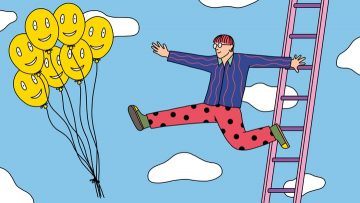Arthur C Brooks in The Atlantic:
 Imagine reading a story titled “The Relentless Pursuit of Booze.” You would likely expect a depressing story about a person in a downward alcoholic spiral. Now imagine instead reading a story titled “The Relentless Pursuit of Success.” That would be an inspiring story, wouldn’t it? Maybe—but maybe not. It might well be the story of someone whose never-ending quest for more and more success leaves them perpetually unsatisfied and incapable of happiness. Physical dependency keeps alcoholics committed to their vice, even as it wrecks their happiness. But arguably more powerful than the physical addiction is the sense that drinking is a relationship, not an activity. As the author Caroline Knapp described alcoholism in her memoir Drinking: A Love Story, “It happened this way: I fell in love and then, because the love was ruining everything I cared about, I had to fall out.” Many alcoholics know that they would be happier if they quit, but that isn’t the point. The decision to keep drinking is to choose that intense love—twisted and lonely as it is—over the banality of mere happiness.
Imagine reading a story titled “The Relentless Pursuit of Booze.” You would likely expect a depressing story about a person in a downward alcoholic spiral. Now imagine instead reading a story titled “The Relentless Pursuit of Success.” That would be an inspiring story, wouldn’t it? Maybe—but maybe not. It might well be the story of someone whose never-ending quest for more and more success leaves them perpetually unsatisfied and incapable of happiness. Physical dependency keeps alcoholics committed to their vice, even as it wrecks their happiness. But arguably more powerful than the physical addiction is the sense that drinking is a relationship, not an activity. As the author Caroline Knapp described alcoholism in her memoir Drinking: A Love Story, “It happened this way: I fell in love and then, because the love was ruining everything I cared about, I had to fall out.” Many alcoholics know that they would be happier if they quit, but that isn’t the point. The decision to keep drinking is to choose that intense love—twisted and lonely as it is—over the banality of mere happiness.
Though it isn’t a conventional medical addiction, for many people success has addictive properties. To a certain extent, I mean that literally—praise stimulates the neurotransmitter dopamine, which is implicated in all addictive behaviors. (This is basically how social media keeps people hooked: Users get a dopamine hit from the “likes” generated by a post, keeping them coming back again and again, hour after miserable hour.) But success also resembles addiction in its effect on human relationships. People sacrifice their links with others for their true love, success. They travel for business on anniversaries; they miss Little League games and recitals while working long hours. Some forgo marriage for their careers—earning the appellation of being “married to their work”—even though a good relationship is more satisfying than any job.
More here.
